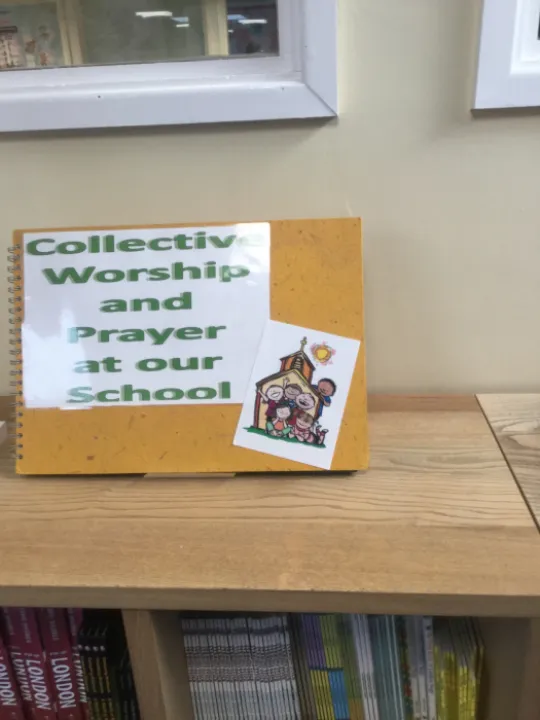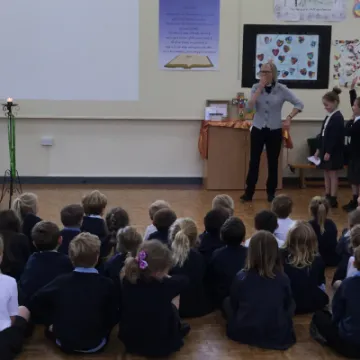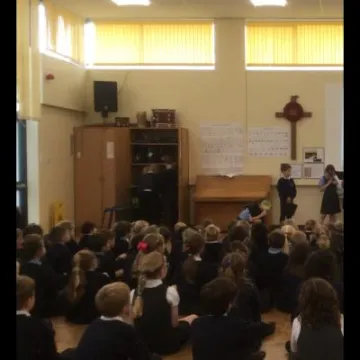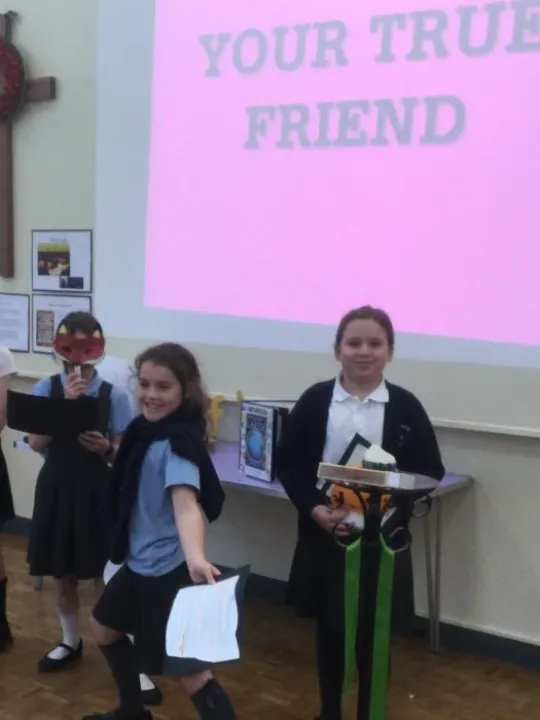Collective Worship
All schools must provide a daily act of collective worship for all pupils. The aim of collective worship is to develop pupils socially, morally, spiritually and culturally.
What is worship?
Worship can be defined as paying homage that which is of worth (worth-ship). Religious worship is the acknowledgement of worth which is attributable to a supreme being. Therefore, in church of England schools, opportunities should be provided for children to offer worship to God, through Jesus Christ.
Collective Worship:
Collective worship is about a school's duty to develop pupils spiritually, morally, socially and culturally. This may include learning about interesting cultural traditions and their meaning, listening to stories with a moral message and reflecting on themes such as strength, courage or loyalty. Collective worship should draw pupils' attention to the values the school wishes to develop both as a body and in each individual. Collective worship is about the growth of the person, their character and social outlook, whatever their academic aptitudes.
Daily collective worship incorporates responses, prayer, reflection incorporating stillness and the lighting of a candle. Christian festivals are celebrated annually: Harvest, Christmas, Easter.
Collective Worship takes place daily and is planned on a termly basis to incorporate all major Christian festivals as well as thought provoking and reflective themes and Anglican traditions. All
Collective Worship include reflection, prayer, a hymn and reference to a relevant biblical passage.
All Worship works around the 3 I's Inclusive, Invitational, and Inspirational. This is important as we want all stakeholders to be part of the spirituality of the school and we encourage this through developing spirituality in 3 ways, Windows – developing an Awareness of the world around us, Mirrors – through reflecting on personal experiences and considering philosophical questions, Doors -providing children the opportunity to put their ideas to action and live their beliefs.
Through Collective Worship pupils will be offered a space and a place for the telling of the Christian story. They will be offered an understanding of worship through being invited to participate in or observe prayer, reading and reflection on the Bible, liturgy, sacrament and experience of the musical and other imaginative riches of Christianity. Opportunities to reflect on the beauty, joy and pain of the world will be given. Pupils will be given time to consider their responsibilities to others and to grow in love and service. Time will be given for celebration, both for the accomplishments of school members and to mark the seasonal festivals of the Christian (and other faiths) calendar. Pupils will be offered time to be able to contemplate and develop spiritually. At Audlem St James Church of England Primary School the daily act of collective worship is viewed as an integral and important part of school life. It is a time where we come together to share our love of God and celebrate our achievements (and sometimes failures) together. The worship of the school is based on promoting the Christian values which permeate the ethos of the school.
At Audlem St James CE Primary School we hold daily worship in the following ways: whole school worship, class-based worship, and key stage worship. The head teacher, Assistant Heads, class teacher and children lead and evaluate worship.
Through collective worship and in the general ethos of the school we seek to promote our vision: Let Your Light Shine
At Audlem St James CE Primary Collective Worship we aim to:
Have a pivotal place in the life of the school.
Support pupils and adults in their spiritual growth
Be the central vehicle by which the school's vision is unpacked and explored so that the whole school community is challenged and engaged with the teachings of Jesus and the Bible.
Provide an experience of worship that will offer opportunities for those present to observe and/or respond to the presence, power and peace of God as understood by Christians. This will always be invitational, offering an opportunity to take part whilst allowing the freedom for those of other faiths and none to be present with integrity.
Support pupils in the development of their understanding of the Trinitarian nature of God in Christian belief
Provide a variety of different opportunities for reflection, understanding of diverse liturgical traditions, participation, challenge and enjoyment where all present can be actively involved and develop their own spirituality whilst contributing to the communal journey.
Help children to become familiar with Christian language and symbolism and the cycle of the Church year so that they are offered a pattern of meanings and a framework into which they can begin to integrate experience.
Explore a variety of ways of praying, giving children the opportunity to form their own prayers using multi-sensory foci and introduce them to some well know Christian prayers, as well as a variety of prayers of thanksgiving before mealtimes and home time.
Offer opportunities to all children and staff to develop their skills in planning, leading and evaluating the impact of school worship with the support and shared engagement of the local church community. Pupils will be at the centre of this process taking on increasingly independent roles in planning and leading worship.
Ensure that materials and themes for worship are carefully selected to make sure pupils understand the work of Christians and the church locally, nationally and globally and how this reflects the teachings of the Bible and the example of Jesus.
There is a raised profile of community leads conducting whole school assemblies, including a worship led by Rev Alison and Daphane 'who tells us stories from the Bible about Jesus and his life.
On Thursdays, the children take part in "Roundabout"assemblies. Each class has a different Christian value that they discuss as a group and share a Bible story. Amethyst class talked about forgiveness and shared the story of The Lost Son and Sapphire class read the story of The Good Samaritan and then had a discussion about the importance of being kind to our friends and neighbours. In Key Stage 2, Amber Class talked about Thankfulness and Ruby class based their session on Peace, looking at different symbols of peace and analysed quotes from the Bible.
Our Partners






